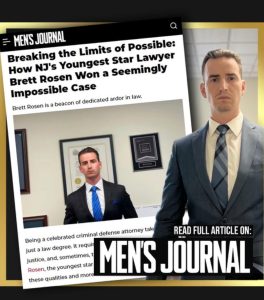Federal Embezzlement Charges in New Jersey: A Comprehensive Guide by Brett M. Rosen, Esq.
Federal Embezzlement Charges Attorney New Jersey

Federal Embezzlement Charges in New Jersey
Embezzlement is a serious white-collar crime that can have devastating consequences for both the accused and the victims. If you or someone you know is facing federal embezzlement charges in New Jersey, it is vital to understand the complexities of this offense and seek experienced legal counsel immediately. This comprehensive guide provides a detailed overview of federal embezzlement laws, potential defenses, and frequently asked questions to help you navigate this challenging legal situation.
What is Embezzlement?
Embezzlement is a type of theft that involves the misappropriation of funds or property by a person entrusted with their care. Unlike robbery or burglary, embezzlement does not involve the use of force or the threat of force. Instead, it is a crime of trust, where the perpetrator takes advantage of their position to steal from their employer, client, or another entity.
Key Elements of Federal Embezzlement:
To secure a conviction for federal embezzlement, the prosecution must prove the following elements beyond a reasonable doubt:
- Entrustment: The defendant must have been entrusted with the care, custody, or control of the funds or property in question. This typically involves a fiduciary relationship, such as an employer-employee relationship, a trustee-beneficiary relationship, or an attorney-client relationship.
- Misappropriation: The defendant must have misappropriated or converted the funds or property for their own use or the use of another person. This means they used the funds or property in a way that was not authorized by the rightful owner.
- Intent: The defendant must have acted with the intent to deprive the rightful owner of the funds or property permanently.
Examples of Embezzlement:
Embezzlement schemes can take many forms, including:
- Employee Theft: An employee stealing money or property from their employer, such as diverting company funds to a personal account, falsifying expense reports, or stealing inventory.
- Financial Advisor Fraud: A financial advisor misappropriating client funds for personal use or making unauthorized investments.
- Attorney Misconduct: An attorney misusing client funds held in trust accounts.
- Government Fraud: A government employee stealing or misusing public funds.
- Union: Misappropriating funds from a labor union.
- Employee Benefit Plan: Stealing funds from a pension plan, 401(k), or other employee benefit plan.
- Mail Fraud or Wire Fraud in Connection with Embezzlement: Using the mail or electronic communications to facilitate an embezzlement scheme.
Federal Embezzlement Statutes
Several federal statutes address embezzlement, depending on the specific circumstances of the offense. Some of the key statutes include:
- 18 U.S. Code § 641: This statute prohibits embezzling, stealing, purloining, or knowingly converting money, property, or other things of value belonging to the United States government.
- 18 U.S. Code § 656: This statute prohibits embezzlement or misapplication of funds by bank officers, directors, employees, or agents.
- 18 U.S. Code § 664: This statute prohibits embezzlement or misappropriation of funds from employee benefit plans.
- 18 U.S. Code § 1503: This statute prohibits embezzlement of funds related to bankruptcy proceedings.
Penalties for Federal Embezzlement
Federal embezzlement convictions carry severe penalties, including:
- Imprisonment: The length of imprisonment varies depending on the specific statute violated and the amount of money or property involved. It can range from several years to decades in prison.
- Fines: Substantial fines, which can be up to twice the amount of money embezzled.
- Restitution: The court may order the defendant to pay restitution to the victim, compensating them for their financial losses.
- Forfeiture: Forfeiture of any assets involved in the embezzlement scheme, including bank accounts, real estate, and other property.
Enhanced Penalties:
In certain cases, the penalties for embezzlement can be enhanced. For example, if the offense:
- Involves a Large Amount of Money: The penalties are generally more severe if the amount of money embezzled is substantial.
- Involves a Vulnerable Victim: If the victim is particularly vulnerable, such as an elderly person or a disabled person, the penalties may be enhanced.
- Is Part of a Pattern of Criminal Activity: If the embezzlement is part of a larger pattern of criminal activity, such as organized crime or money laundering, the penalties can be more severe.
Defenses to Federal Embezzlement Charges
Building a strong defense against federal embezzlement charges requires a thorough understanding of the law and the specific facts of the case. Some potential defenses include:
- Lack of Intent: The prosecution must prove that the defendant acted with the intent to deprive the rightful owner of the funds or property permanently. If the defendant can show they lacked this intent or that they intended to repay the funds, it may be a defense.
- Authorization: If the defendant can show they were authorized to use the funds or property in question, it may be a defense.
- Mistake of Fact: If the defendant made a mistake of fact that led to the misappropriation of funds, it may be a defense.
- Insufficient Evidence: If the prosecution lacks sufficient evidence to prove the elements of the offense beyond a reasonable doubt, the defendant may be acquitted.
- Entrapment: If law enforcement officials induced the defendant to commit embezzlement, it may be a defense.
- Repayment: If the defendant repaid the money or property before being charged, it may be a mitigating factor in sentencing.
- Violation of Constitutional Rights: If law enforcement violated the defendant’s constitutional rights during the investigation or arrest, the evidence obtained may be suppressed, potentially leading to a dismissal of the charges.
Investigative Techniques in Embezzlement Cases
Federal agencies employ various investigative techniques to uncover and prosecute embezzlement schemes. These techniques include:
- Financial Analysis: Analyzing bank records, financial statements, and other financial documents to trace the flow of money and identify suspicious transactions.
- Surveillance: Conducting physical and electronic surveillance to monitor the defendant’s activities and gather evidence.
- Subpoenas: Issuing subpoenas to compel the production of documents or testimony from witnesses.
- Search Warrants: Obtaining search warrants to seize evidence from the defendant’s home, business, or other locations.
- Undercover Operations: Using undercover agents or informants to infiltrate embezzlement schemes and gather evidence.
FAQs about Federal Embezzlement Charges in New Jersey
- What is the difference between embezzlement and theft?
Embezzlement is a type of theft that involves the misappropriation of funds or property by a person entrusted with their care. Theft is a broader term that encompasses various forms of stealing, including embezzlement, robbery, and burglary.
- Can I be charged with embezzlement even if I intended to repay the funds?
Yes, you can be charged with embezzlement even if you intended to repay the funds. The focus is on the act of misappropriation and the intent to deprive the rightful owner of the funds, even temporarily.
- What are some red flags that may indicate embezzlement?
Red flags that may indicate embezzlement include: * Living beyond one’s means * Unexplained financial transactions * Refusal to take vacations or allow others to handle their duties * Defensiveness when questioned about finances
- What should I do if I suspect embezzlement?
If you suspect embezzlement, you should report it to the appropriate authorities, such as your employer, the police, or the FBI.
- How can an attorney help me with federal embezzlement charges?
An attorney can play a vital role in your defense by: * Investigating the charges and gathering evidence * Challenging the prosecution’s case * Negotiating with the prosecutor for a plea deal * Representing you in court * Protecting your constitutional rights
Why Choose Brett M. Rosen, Esq. for Federal Embezzlement Cases?

Federal embezzlement cases are complex and require a skilled and experienced defense attorney. Brett M. Rosen, Esq. has a deep understanding of federal embezzlement laws and a proven track record of success in defending clients against these charges. He will:
- Conduct a thorough investigation of the charges and the evidence against you.
- Develop a strong defense strategy tailored to your specific circumstances.
- Challenge the prosecution’s case at every stage of the proceedings.
- Negotiate with the prosecutor to seek a favorable resolution.
- Provide aggressive and effective representation in court.
In addition, Brett M. Rosen, Esq. is a highly accomplished and respected criminal defense attorney based in Elizabeth, New Jersey. He’s known for his dedicated and aggressive representation of clients facing a wide range of criminal charges in both state and federal courts. Here’s what makes him stand out:
- Extensive Experience: He has a proven track record of success defending clients against various charges, including DUI/DWI, drug crimes, assault, theft, domestic violence, weapons offenses, white-collar crimes, and federal offenses.
- Certified Criminal Trial Attorney: He holds the prestigious certification by the Supreme Court of New Jersey as a Criminal Trial Attorney, a distinction held by less than 1% of attorneys in the state. This certification highlights his exceptional knowledge and skill in criminal trial law.
- Licensed in Two States: He is licensed to practice law in both New Jersey and New York, allowing him to assist clients in a wider geographical area.
- High-Profile Cases: He has represented numerous high-profile individuals, including celebrities and a Grammy Award-winning artist, demonstrating his ability to handle complex and sensitive cases with discretion and effectiveness.
- Passionate Advocate: He is known for his passionate advocacy, unwavering dedication to his clients, and assertive courtroom presence. He is skilled at telling compelling stories and conducting effective cross-examinations to challenge the prosecution’s case.
- Recognition and Awards: He has received numerous accolades and recognition for his legal work, further solidifying his reputation as a top criminal defense attorney.
If you or someone you know is facing federal embezzlement charges in New Jersey, contact Brett M. Rosen, Esq. today for a free consultation. He is available 24/7 to discuss your case and provide expert legal guidance. 908-312-0368 & brett@nynjcriminalcivilesq.com
Disclaimer: This information is for informational purposes only and should not be considered legal advice. It is essential to consult with an attorney to discuss your specific legal situation.
